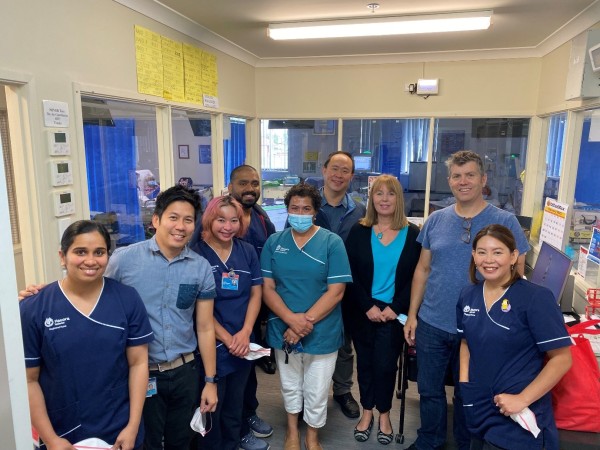
L-R Asha Thomas, RN ; Gilbert Go, CNM; Gilar Merto, RN; Basil Baby, SCN; Sophia Stuart, CNS; Eddie Tan, WDHB Renal Physician; Nicola Hagan WDHB CNM; Drew Henderson, WDHB Medical Director Cancer & LTC; Mazelle Go, RN
A dialysis machine cleans your blood when your kidneys can no longer do the job. It removes the body's waste and helps control blood pressure. To do its job, it needs highly clean water and power.
Many patients travel to Gisborne Hospital every week to have life-saving dialysis treatment. So when Cyclone Gabrielle hit, it took teamwork, dedication, creativity and innovation to provide the best care possible.
Without internet, phone, generator power only and road access cut off to many areas, the Gisborne Hospital dialysis unit team rallied together and created a plan to make contact and provide the best care possible for their patients.
Gilbert Go, manager of the dialysis unit, is incredibly proud of his team.
“We went to patient’s houses to check on them, to reassure them and assess their needs. If a patient wasn’t home, we left a handwritten letter under their front door.
“We had never faced such challenges before, but everyone pulled together and went above and beyond in a time when the community needed it most,” said Mr Go.
With roads to the coast in ruins, patients needed to be transported by helicopter for treatment.
“With so much emergency response required across Tairāwhiti and limited communications, we often needed someone to physically go to the Civil Defence centre to arrange flights for our patients.
“From accommodation, food to transport, it was the help received from other teams within the hospital that really eased the burden,” said Mr Go.
“Dialysis is not just about hooking a patient with needles or to a machine. Holistic care is essential,” said Mr Go.
“Our work doesn’t end at the four corners of the dialysis unit, it’s a journey for us and our patients, one that the team here is dedicated and passionate about., even during emergencies and disasters.”
“With many of our patient’s homes severely impacted by the floods, we aren’t returning to business as usual any time soon, but like most of Tairāwhiti, we are resilient.
“We will take each day as it comes and continue to provide excellent support and care to our patients and community”.
